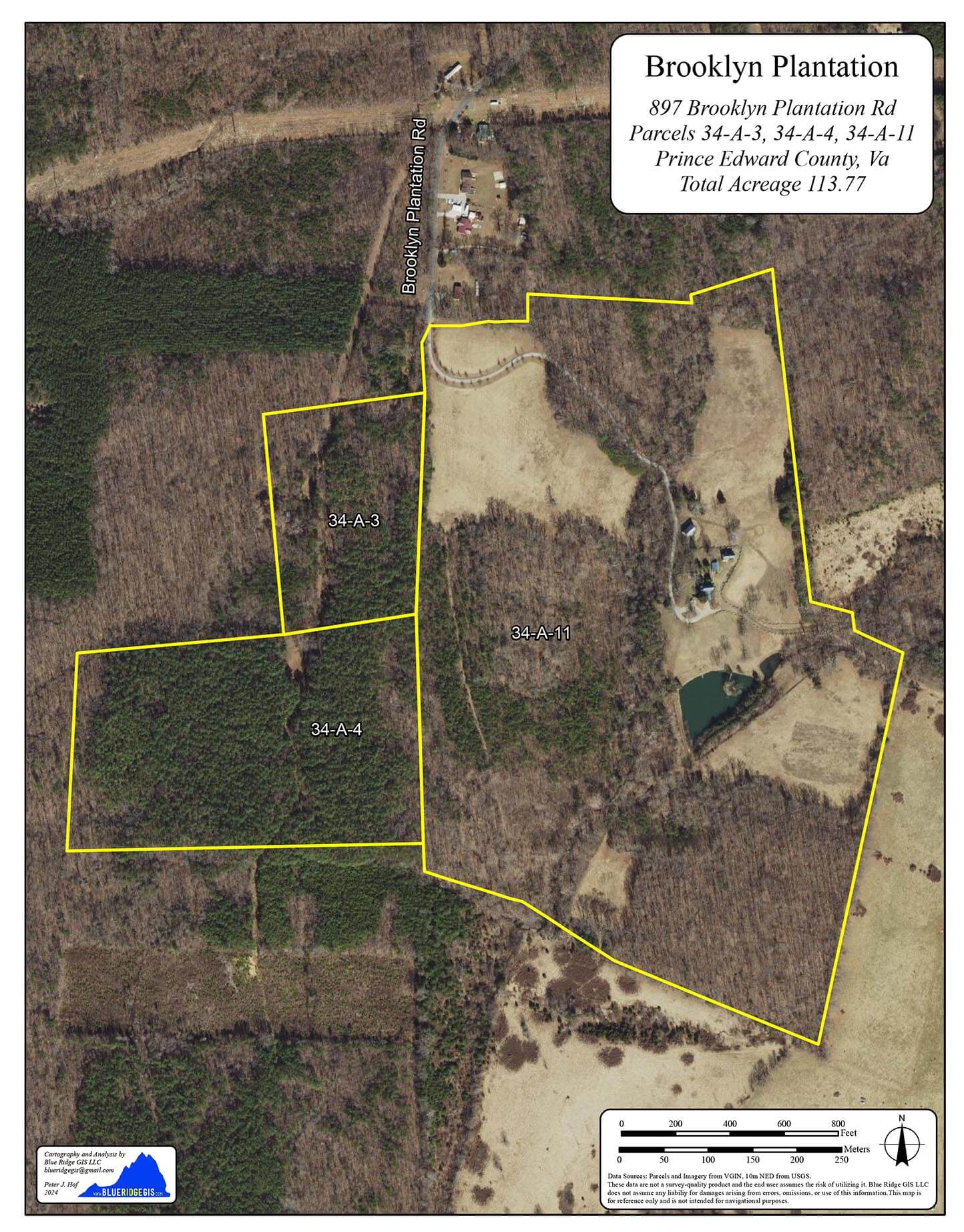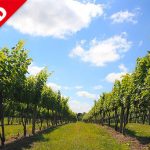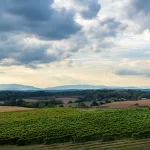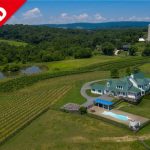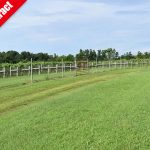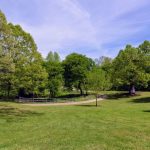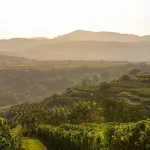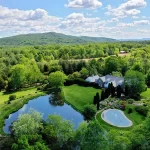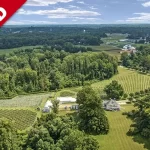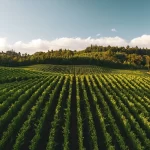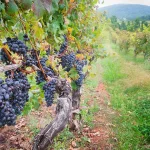Brooklyn Plantation
Brooklyn Plantation
This is it—your expansive country estate where you, your family, and guests will enjoy a gracious and active country lifestyle in this historic (1813) and meticulously restored home and two log guest cabins, surrounded by 113.77 acres of seclusion, tranquility, and natural beauty!
Moreover, this country estate is quite proximate to the following towns/metro areas, thus enabling a true “town and country” lifestyle:
- Farmville: 9 miles or 14 min.
- Appomattox: 21 miles or 20 min.
- Lynchburg: 41 miles or 48 min.
- Charlottesville: 62 miles or 1 hr. 15 min.
- Richmond: 74 miles or 1 hr. 20 min.
Enter Brooklyn through the stone columned, gated entry drive and feel the cares of the world begin to fade away as you proceed out the long, tree-lined drive that leads to a circular driveway and parking area to the right rear of the main home. In view nearby is pond site and 2 log guest cabins, and workshop/office building. The lovely pond site has a walking bridge access to an island, where there is a clearing with rustic seating around a fire pit/campfire area.
There was very extensive restoration work completed circa 2004 on the main home and log guest cabins, and this restoration retained nearly all original woodwork, floors, door hardware and other important architectural elements of the structures. The main home boasts 3,811 SF of living space on 4 levels with many fine and unique fitments, including an English Basement with walk-in wine cellar, and a traditional English Garden & deck area outdoors. Entertaining guests both indoors and outdoors is easily accomplished in any season of the year in this beautiful and spacious home.
Also, there are multiple fireplaces throughout the main home and the log guest cabins, with a combination of wood-burning and gas logs—all of which add much warmth and appeal to the historic nature of these structures. There is also a woodburning stove in the separate, well-appointed office space in the workshop/office building.
The unique and highly appealing log guest cabins are only steps away from the main home, making it very convenient and accommodating for your overnight guests. In fact, the original and quite authentic historic structural elements have all been retained—from the original fireplaces to the beamed ceilings and exposed log walls. Guests staying in these log cabins will likely be so delighted with their cozy, comfortable and historic surroundings—it may be difficult to have them appear on time for breakfast in the main home!
The smaller of the two log guest cabins is about 864 SF with 2BR and 1BA.
The larger log guest cabin is about 1,603 SF with 4BR and 4BA (all baths ensuite).
The overall acreage with both forested areas and open fields/meadows is well-suited for horses, hiking, hunting, shooting sports, wine-grape vineyards, orchards, etc. There is also clear potential for a B&B operation and/or the development of a family enclave is entirely possible with several potential additional home sites on the property.
Regarding the potential for wine-grape vineyard sites at Brooklyn, several sites would offer good elevations in the 470 to 500 feet ASL range, and also be conducive for planting the vineyard rows with a north to south orientation—which is the crucial to proper maturation of the fruit zone. And please see the notes below, which make clear that the land and elevations at Brooklyn have historically proven to be ideal for grape production.
Interesting Notes on the Early History of Brooklyn Plantation:
In 1775, Tarleton Woodson of Prince Edward County was commissioned as an Ensign in the First Battalion of Virginia Forces soon to become the Continental Army under George Washington. Shortly thereafter in 1776, the property near Prospect, VA was given to Tarleton Woodson, by his father Charles Woodson, but since the Revolutionary War was then about to get fully underway—building a home on the property was set aside for a later time.
While serving in battle on Long Island New York, Ensign Woodson was taken as a prisoner of war by the British forces and placed in a prison in Brooklyn New York. It was during this time that he met and fell in love with his future wife, Anne Van der Veer, who was helping to provide care for the American prisoners at that place.
Following the Revolutionary War, Tarleton Woodson attained the rank of General in the Virginia Militia, served with distinction in the House of Delegates, and was a Presidential Elector in 1792, in connection with the election of George Washington to his second term as President of the United States.
In 1813, General Woodson built a new home on the property near Prospect Virginia which his father had gifted to him in 1776—and he named it “Brooklyn Plantation” in honor and fond memory of the place where he had met and fell in love with his wife Anne.
At Brooklyn, General Woodson and his son Charles carried on what was then leading-edge agricultural experimentation and development of more efficient and productive farming techniques and were well recognized for such efforts.
Here is an excerpt from the December 1886 issue of Southern Farmer about those efforts, and, in particular, about the Woodson wine grape:
‘The Woodson grape was first introduced by Tarleton Woodson. It originated upon the farm of Dr. Terry, called “Hard Times.” In Kenrich’s New American Orchardist, edition 1843, Dr. Norton, near Richmond, is quoted as recommending this grape for the manufacture of sparkling wine. Howning also speaks highly of the Woodson grape. It is perhaps too late in bearing for latitudes north of Virginia, ripening just before frost. It is an abundant bearer. The original vines grafted on the Woodson farm have never failed to bear annually an enormous crop, and today the vines are as vigorous as ever, yearly producing their long, heavy bunches of red grapes without any pruning or cultivation. It is noted among winemakers as the best grape for dry wine.”
General Woodson passed away in 1818 at the age of 63, yet as stated above, his Woodson wine grape (known also as the Woodson vine) had already been introduced into regular cultivation prior to his death. Hence, the Woodson wine grape predated the discovery of the Norton Grape in about 1817 but was only first cultivated in Richmond with native American vines in the 1820s. The Norton often gets credited as the first wine grape put into production in Virginia—however, it now appears that distinction truly belongs to the Woodson grape—first grafted and produced at Brooklyn Plantation.
In Summary:
Brooklyn Plantation represents a distinctive, historic, and unique country estate with expansive acreage, seclusion, ample finished living space in the main home and guest cabins, many indoor and outdoor amenities for entertaining, and provides numerous opportunities for active outdoor pursuits. In short, it’s all here—the true “town and country” lifestyle that has been sought by many for themselves, their family, and their friends over the years. Please take steps now to make it yours!
Properties similar to Brooklyn Plantation:
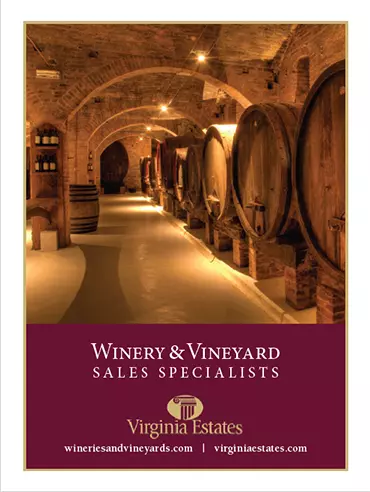
Listing Courtesy of Virginia Estates Inc







